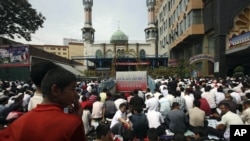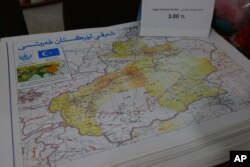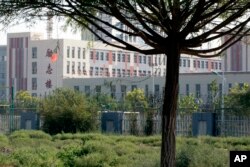A Chinese official denies allegations by activists that China’s government is blocking Muslim religious practices in the restive Xinjiang region during the holy month of Ramadan.
A Chinese diplomat in neighboring Pakistan said Beijing has put only partial restrictions on Ramadan activities, not a total ban on fasting by the Uighur minority in Xinjiang.
“There’s no blanket ban. That’s Western propaganda,” Lijian Zhao, the deputy chief of mission at China’s embassy in Islamabad, told VOA.
Zhao said that Xinjiang residents were free to fast during Ramadan and that restrictions were limited to those with official responsibilities to ensure their religious practices did not interfere with their public duties.
“Restrictions are with the Communist Party members, who are atheists; government officials, who shall discharge their duties; and students who are with compulsory education and hard learning tasks,” he said.
Chinese officials do not disclose how many people fall under those categories. But the groups would include as many as two million Uighurs who are believed to be undergoing compulsory education in prison camps in Xinjiang.
The diplomat's comments come as human rights activists and Uighur advocacy groups have expressed concern about the Chinese government's widening its repression of thousands of Uighurs as they joined millions of Muslims from around the world to fast during Ramadan, which began May 5 and continues for a month.
Tougher restrictions
Dolkun Isa, the head of the Germany-based World Uighur Congress, told VOA that Uighurs who are working in the public sector and students are asked to appear daily at canteens during lunch or they will be accused of secretly fasting and hiding “extremist” tendencies.
Disputing Zhao’s assertion that the restrictions were limited, the exiled Uighur leader Isa said government workers were also forced to take home food and share with their family members. Other common Muslim practices, such as attending prayer and wearing a headscarf, are also banned for local residents.
“In some cases, Uighur employees are forced to take home pork and ordered to share with their families,” said Isa. “The restrictions on Ramadan have been in place every year since 2016, but they are especially hard this year.”
Separatist movement
The vast region of deserts and mountains in the northwest is home to nearly 22 million people and has the greatest concentration of Muslims in China, estimated to be about 11 million Uighurs and other Turkic Muslim minorities.
Conflict in the region is not new. The Chinese government has for decades suppressed a separatist movement by Uighurs to establish an independent state called East Turkestan. Uighurs accuse the government of forcing demographic changes by settling millions of Han Chinese in the region.
The government in Beijing has in recent years faced growing international condemnation over the detention of more than a million minority Uighurs and other Muslims in so-called re-education camps.
Detention camps
Earlier this month, Randall Schriver, who leads Asia policy at the U.S. Department of Defense, said that the estimated number of detainees could be “closer to 3 million citizens.”
“The Communist Party is using the security forces for mass imprisonment of Chinese Muslims in concentration camps,” Schriver said at a Pentagon briefing.
The term “concentration camps” is generally associated with the death camps operated by Nazi Germany in 1940s.
Chinese officials, however, say that their measures in Xinjiang are needed to combat the threat of terrorism and that the camps are nothing but vocational training centers. They are asking the U.S. to “stop interfering” in their domestic affairs.
“We urge the relevant U.S. individual to respect the fact, abandon bias, exercise prudence in words and deeds, stop interfering in China’s domestic affairs, and earnestly contribute to mutual trust and cooperation between us,” said Chinese Foreign Ministry spokesperson Geng Shuang at a press briefing last week.
Shuang said their measures at “vocational and educational training institutions” operate according to law and they endorse all ethnic group members with “positive social effects.”
Anti-terror law
In December 2015, China passed its controversial anti-terror law, which according to Human Rights Watch gave government agencies “enormous discretionary powers.”
The government’s April 2017 regulations to “prevent extremism” drew international outcry, with critics saying they violated basic human rights and religious freedom.
According to the state-run newspaper China Daily, the regulations forbid people in the region from wearing full-face coverings and long beards. They also prohibit them from “choosing names in an abnormal way” or “rejecting or refusing state products and services that include radio and television programming.”







